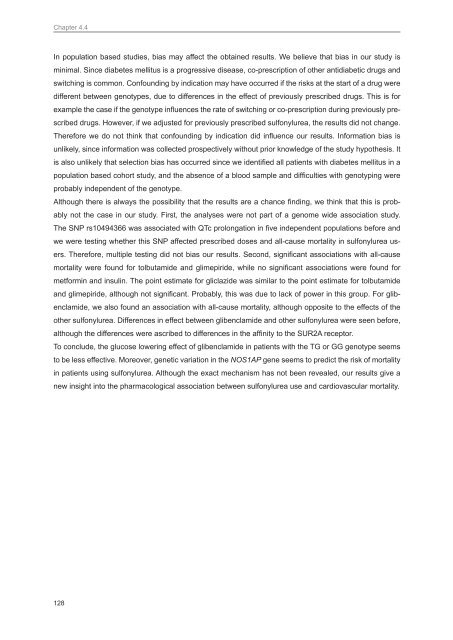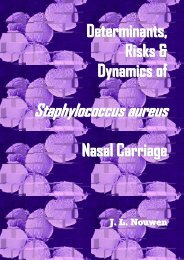Genetic susceptibility to adverse drug effects - Epidemiology ...
Genetic susceptibility to adverse drug effects - Epidemiology ...
Genetic susceptibility to adverse drug effects - Epidemiology ...
Create successful ePaper yourself
Turn your PDF publications into a flip-book with our unique Google optimized e-Paper software.
Chapter 4.4<br />
In population based studies, bias may affect the obtained results. We believe that bias in our study is<br />
minimal. Since diabetes mellitus is a progressive disease, co-prescription of other antidiabetic <strong>drug</strong>s and<br />
switching is common. Confounding by indication may have occurred if the risks at the start of a <strong>drug</strong> were<br />
different between genotypes, due <strong>to</strong> differences in the effect of previously prescribed <strong>drug</strong>s. This is for<br />
example the case if the genotype influences the rate of switching or co-prescription during previously prescribed<br />
<strong>drug</strong>s. However, if we adjusted for previously prescribed sulfonylurea, the results did not change.<br />
Therefore we do not think that confounding by indication did influence our results. Information bias is<br />
unlikely, since information was collected prospectively without prior knowledge of the study hypothesis. It<br />
is also unlikely that selection bias has occurred since we identified all patients with diabetes mellitus in a<br />
population based cohort study, and the absence of a blood sample and difficulties with genotyping were<br />
probably independent of the genotype.<br />
Although there is always the possibility that the results are a chance finding, we think that this is probably<br />
not the case in our study. First, the analyses were not part of a genome wide association study.<br />
The SNP rs10494366 was associated with QTc prolongation in five independent populations before and<br />
we were testing whether this SNP affected prescribed doses and all-cause mortality in sulfonylurea users.<br />
Therefore, multiple testing did not bias our results. Second, significant associations with all-cause<br />
mortality were found for <strong>to</strong>lbutamide and glimepiride, while no significant associations were found for<br />
metformin and insulin. The point estimate for gliclazide was similar <strong>to</strong> the point estimate for <strong>to</strong>lbutamide<br />
and glimepiride, although not significant. Probably, this was due <strong>to</strong> lack of power in this group. For glibenclamide,<br />
we also found an association with all-cause mortality, although opposite <strong>to</strong> the <strong>effects</strong> of the<br />
other sulfonylurea. Differences in effect between glibenclamide and other sulfonylurea were seen before,<br />
although the differences were ascribed <strong>to</strong> differences in the affinity <strong>to</strong> the SUR2A recep<strong>to</strong>r.<br />
To conclude, the glucose lowering effect of glibenclamide in patients with the TG or GG genotype seems<br />
<strong>to</strong> be less effective. Moreover, genetic variation in the NOS1AP gene seems <strong>to</strong> predict the risk of mortality<br />
in patients using sulfonylurea. Although the exact mechanism has not been revealed, our results give a<br />
new insight in<strong>to</strong> the pharmacological association between sulfonylurea use and cardiovascular mortality.<br />
128









